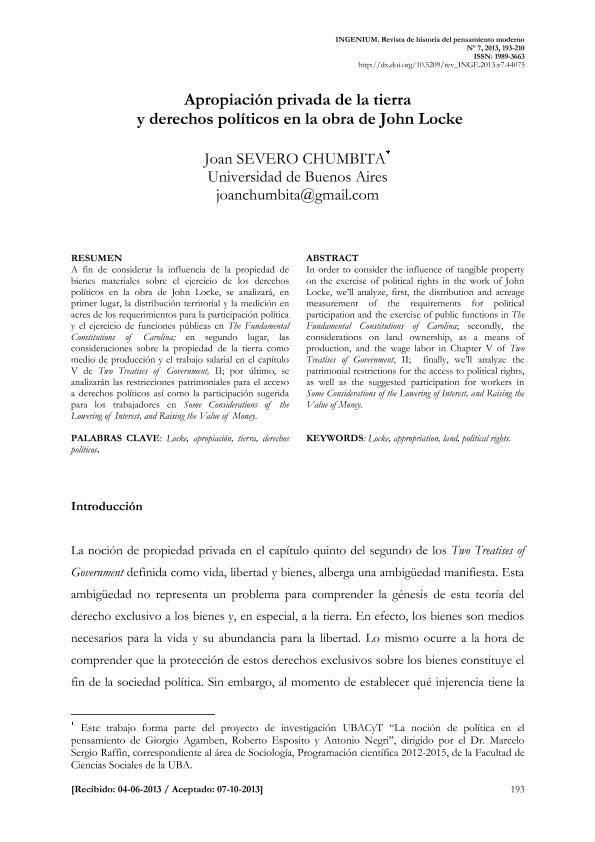Artículo
A fin de considerar la influencia de la propiedad de bienes materiales sobre el ejercicio de los derechos políticos en la obra de John Locke, se analizará, en primer lugar, la distribución territorial y la medición en acres de los requerimientos para la participación política y el ejercicio de funciones públicas en "The Fundamental Constitutions of Carolina"; en segundo lugar, las consideraciones sobre la propiedad de la tierra como medio de producción y el trabajo salarial en el capítulo V de "Two Treatises of Government", II; por último, se analizarán las restricciones patrimoniales para el acceso a derechos políticos así como la participación sugerida para los trabajadores en "Some Considerations of the Lowering of Interest, and Raising the Value of Money". In order to consider the influence of tangible property on the exercise of political rights in the work of John Locke, we’ll analyze, first, the distribution and acreage measurement of the requirements for political participation and the exercise of public functions in The Fundamental Constitutions of Carolina; secondly, the considerations on land ownership, as a means of production, and the wage labor in Chapter V of Two Treatises of Government, II; finally, we’ll analyze the patrimonial restrictions for the access to political rights, as well as the suggested participation for workers in Some Considerations of the Lowering of Interest, and Raising the Value of Money.
Apropiación privada de la tierra y derechos políticos en la obra de John Locke
Fecha de publicación:
12/2013
Editorial:
Universidad Complutense de Madrid
Revista:
Ingenium
e-ISSN:
1989-3663
Idioma:
Español
Tipo de recurso:
Artículo publicado
Clasificación temática:
Resumen
Palabras clave:
Locke
,
Apropiación
,
Tierra
,
Derechos Políticos
Archivos asociados
Licencia
Identificadores
Colecciones
Articulos(SEDE CENTRAL)
Articulos de SEDE CENTRAL
Articulos de SEDE CENTRAL
Citación
Chumbita y Gamba, Joan Severo; Apropiación privada de la tierra y derechos políticos en la obra de John Locke; Universidad Complutense de Madrid; Ingenium; 7; 12-2013; 193-210
Compartir
Altmétricas




